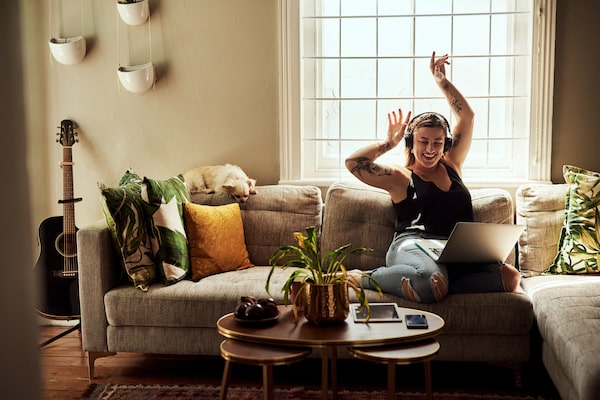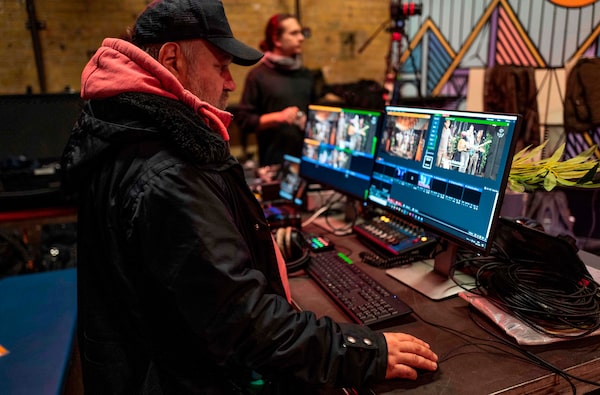
Online parties have become popular because there’s no need to leave your home to connect, and right now, social connection is vitally important.Yuri Arcurs peopleimages.com/iStockPhoto / Getty Images
The first time Marisa Rosa Grant attended Club Quarantine, she decided to wear a cute, glow-in-the-dark outfit. She wasn’t exactly sure what to expect, but she knew it was a party and if there’s one thing the Toronto event producer knows how to dress for, it’s parties. Then, at 9 p.m., she used an invite code to log into the “club”– which was actually a Zoom conference call.
Club Quarantine is a nightly queer dance party founded by four Torontonians – Casey MQ, Brad Allen, Andrés Sierra and Mingus New – that started with nine attendees at its first event on March 16 and now regularly has waitlists to enter the party (Zoom has a 1,000-person limit), celebrity guest DJs (Charli XCX performed a half-hour set on March 25) and more than 20,000 Instagram followers. And that’s not the only way Club Q mirrors a real-life nightclub; attendees often dress up for a night out, even if their corner of the party is located in their living rooms. A bouncer will eject party-goers who don’t follow the rules. Attendees can even make a donation via PayPal, an approximation of a cover charge that organizers use to pay the DJs and drag artists who perform each night.
“Right now, it’s a lot of really sad news on social media, or just coronavirus [posts] everywhere. It’s nice to go into Club Q and completely forget about all that stuff, because you’re seeing hundreds of people on camera smiling or dancing,” Grant says. “We have to keep our physical distance from people in this moment, but every night from nine to 12, you feel connected.”
Club Quarantine is far from the only online party that has popped up over the past two weeks. Toronto DJs Dr. Jay and Starting From Scratch have also performed sets on Instagram Live. On March 14, DJ Mel, a DJ in Austin, Tex., streamed a set from his living room via Facebook Live, racking up 548,000 views. Olha Udovenko, the resident DJ at a Ukrainian nightclub, has been going live from the empty club, while regular patrons tune in from home. Real-life parties are even getting into the game; That Slow Jam Party, a regular Toronto party with a playlist of exclusively R&B and soul ballads, hosted a virtual party on March 27 after its regular events were cancelled due to physical distancing. And big-name DJs such as Diplo, Questlove and hip-hop icon DJ D-Nice have hosted events, too. D-Nice’s virtual house parties – which he initially called “Homeschool,” though many attendees are also referring to them as Club Quarantine – have attracted celebrities such as Michelle Obama, Oprah, Rihanna, Janet Jackson, Ellen DeGeneres and Drake, not to mention upwards of 100,000 virtual party-goers.
This is surprising, considering how few people regularly go clubbing anymore. In a 2016 survey by YPulse, a consumer research company focused on young people, only 37 per cent of 18-to-33-year-old respondents said they went out every week; 40 per cent said they go out once or a few times a month and 23 per cent said they go out less than once a month or never. In fact, 72 per cent of millennials and teens said they would rather stay in on the weekends than go out at night.
But these online parties work because there’s no need to leave your home to connect with one another, and right now, connection is vitally important. “The power is in community,” says Brad Allen, one of Club Quarantine’s founders. “[The queer community] has only ever gotten ahead through holding each other up. There are no systems in place that do that for us, [so] when something like this happens and we’re ripped from one another, it affects us. A lot of queer people are already dealing with mental stress, so putting the coronavirus on top of this can be harmful. We’re using this party to counteract that as best as we can.”

Technicians responsible for the livestream perform a soundcheck with Berlin pop group Il Civetto at the Kater Blau club in Berlin on March 20, 2020, prior to a live-streamed concert.JOHN MACDOUGALL/AFP/Getty Images
In some ways, they may be even better than outings to real clubs, and not just because the dress code is more relaxed. Experts say there are mental-health benefits to dancing it out. Elaisha Jade, a mental-health advocate and meditation teacher who tuned into one of Dr. Jay’s soca sets, says being able to party from a distance has provided a welcome distraction from the news. “Dancing can be a spiritual, transformational and healing experience. Even though I can’t control the events of the world [or the] tragedies and uncertainties, I can at least dance to get myself out of the cycle of anxious thoughts in my head and have a little fun,” she says.
And then there’s the fact that these parties are also something new to do, which means they help alleviate boredom, which may have mental health implications, too. “We do know that people are much more likely to struggle with boredom when they are alone,” says John Eastwood, a clinical psychologist and assistant professor in the department of psychology in York University’s faculty of health.
He stresses that other issues, such as financial uncertainty and the trauma frontline workers are experiencing right now, are more pressing, but says we shouldn’t underestimate the impact of boredom because it’s associated with “a host of psychological and social problems.”
And many Canadians are likely struggling with it right now. “There's a little bit of research on the psychological impacts of quarantine, some of [it] done after SARS, and boredom was one of the most commonly reported difficult feelings that people were coping with. In one study, it was the top one,” he says.
For many, these parties are also a way to do something that feels “normal,” even if they haven’t actually gone clubbing in a while. During one of DJ D-Nice’s marathon Homeschool sets, some viewers were live-tweeting as they danced. But they weren’t just calling out their favourite songs or calling out the celebrities who had dropped in; some were joking about being in line with their IDs ready or tagging friends who they “saw” arrive at the party.
In fact, they’ve become so mainstream – and so common – that they might just stick around. Grant thinks so, at least. She hosts her own monthly party for queer people of colour; in March she teamed up with Club Quarantine for a virtual event. But she’s also thinking about incorporating a livestream when real-life events are back on.
“When [physical] distancing is over, we’re going to have our regular party out of a venue, and then also have options for it to be livestreamed so people join in that way,” she says. “People can come from around the world.”
People on social media are sharing imaginative ways of entertaining, informing and having fun while staying isolated during the COVID-19 pandemic. Here’s a compilation of some that made us smile.
The Globe and Mail
Sign up for the weekly Style newsletter, your guide to fashion, beauty and design, and follow us on Instagram @globestyle.